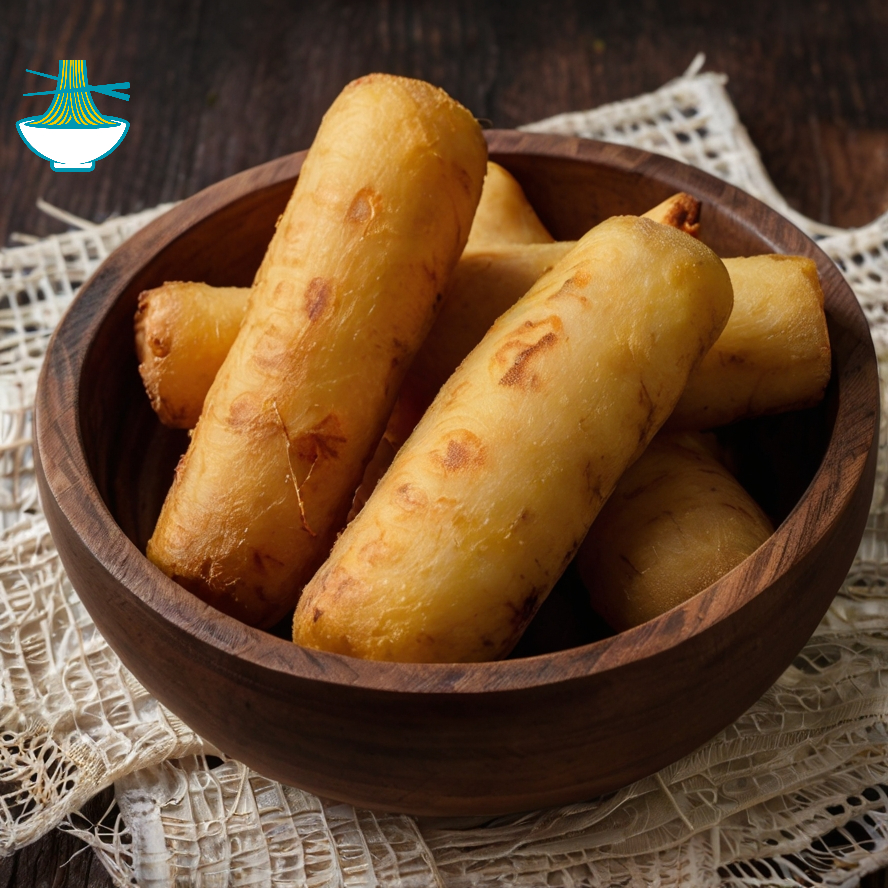Enyucado is a beloved Colombian snack made primarily from yuca (cassava), a starchy root vegetable prevalent in Latin American cuisine. This delightful treat is known for its sweet and nutty flavor, resulting from the addition of sugar and grated coconut. The texture of enyucado is crispy on the outside and soft on the inside, making it a satisfying snack for many.

Ingredients
- 2 cups of grated yuca or cassava
- 1/2 cup of sugar
- 1/2 cup of grated coconut
- 1/4 cup of melted butter
- 1/4 cup of milk
- 1/4 teaspoon of salt
- Oil for frying
Instructions
1. Prepare the Yuca: Peel the yuca and grate it finely. If using frozen grated yuca, ensure it is thawed and drained.
2. Mix Ingredients: In a mixing bowl, combine the grated yuca, sugar, grated coconut, melted butter, milk, and salt. Mix until you have a thick batter.
3. Heat the Oil: Heat oil in a frying pan over medium heat.
4. Form the Balls: Scoop out spoonfuls of the batter and form them into small balls.
5. Fry the Balls: Carefully place the balls into the hot oil and fry until they are golden brown and crispy.
6. Drain the Excess Oil: Remove the enyucado from the oil and place them on paper towels to drain off any excess oil.
Notes
- If fresh yuca is unavailable, frozen grated yuca can be used as a substitute.
- For additional flavor, consider adding ingredients such as cheese or ground cinnamon to the batter.
- Enyucado is typically served with coffee or hot chocolate.
Enyucado is not just a snack; it's a piece of Colombian culinary tradition. Its delightful blend of flavors and textures makes it a must-try for anyone exploring Latin American cuisine. Enjoying enyucado with a warm beverage is a perfect way to experience the rich culinary heritage of Colombia.

Nutrition Value:
1. 2 cups of grated yuca or cassava
- Calories: Approximately 330 kcal
- Carbohydrates: 78g
- Protein: 2g
- Fat: 0.6g
- Sodium: 10mg
- Cholesterol: 0mg
- Vitamins: Vitamin C, B vitamins
- Minerals: Potassium, Magnesium, Calcium
- Nutritional Benefit: Yuca is a good source of carbohydrates and provides essential vitamins and minerals. It is also rich in dietary fiber, which aids digestion.
2. 1/2 cup of sugar
- Calories: 387 kcal
- Carbohydrates: 100g
- Protein: 0g
- Fat: 0g
- Sodium: 1mg
- Cholesterol: 0mg
- Vitamins: None
- Minerals: None
- Nutritional Benefit: Sugar provides a quick source of energy. However, it should be consumed in moderation due to its high-calorie content and lack of essential nutrients.
3. 1/2 cup of grated coconut
- Calories: 150 kcal
- Carbohydrates: 6g
- Protein: 1.5g
- Fat: 13g
- Sodium: 5mg
- Cholesterol: 0mg
- Vitamins: Vitamin E, B vitamins
- Minerals: Iron, Manganese, Zinc
- Nutritional Benefit: Grated coconut is rich in healthy fats, particularly medium-chain triglycerides (MCTs), which can provide a quick source of energy. It also contains fiber and several essential minerals.
4. 1/4 cup of melted butter
- Calories: 400 kcal
- Carbohydrates: 0g
- Protein: 0.5g
- Fat: 45g
- Sodium: 360mg
- Cholesterol: 122mg
- Vitamins: Vitamin A, Vitamin D, Vitamin E
- Minerals: Calcium
- Nutritional Benefit: Butter provides a rich source of fat-soluble vitamins and is a good source of energy. It should be used in moderation due to its high cholesterol and saturated fat content.
5. 1/4 cup of milk
- Calories: 42 kcal
- Carbohydrates: 5g
- Protein: 3.4g
- Fat: 1g
- Sodium: 42mg
- Cholesterol: 5mg
- Vitamins: Vitamin D, B vitamins
- Minerals: Calcium, Potassium
- Nutritional Benefit: Milk is a good source of protein, calcium, and several essential vitamins. It supports bone health and provides a balanced mix of macronutrients.
6. 1/4 teaspoon of salt
- Calories: 0 kcal
- Carbohydrates: 0g
- Protein: 0g
- Fat: 0g
- Sodium: 581mg
- Cholesterol: 0mg
- Vitamins: None
- Minerals: Sodium, Chloride
- Nutritional Benefit: Salt is essential for maintaining fluid balance and nerve function. However, it should be used sparingly to avoid excessive sodium intake.
7. Oil for frying
- Calories: Varies depending on the type of oil (about 120 kcal per tablespoon)
- Carbohydrates: 0g
- Protein: 0g
- Fat: 14g per tablespoon
- Sodium: 0mg
- Cholesterol: 0mg
- Vitamins: Vitamin E (in some oils)
- Minerals: None
- Nutritional Benefit: Cooking oils provide essential fatty acids and energy. Some oils, like olive oil, contain healthy monounsaturated fats and antioxidants.
Overall Nutritional Benefits
Enyucado, made with these ingredients, offers a mix of carbohydrates for energy, fats for satiety, and some essential vitamins and minerals. While it is a calorie-dense snack, it can be enjoyed in moderation as part of a balanced diet.


Comments